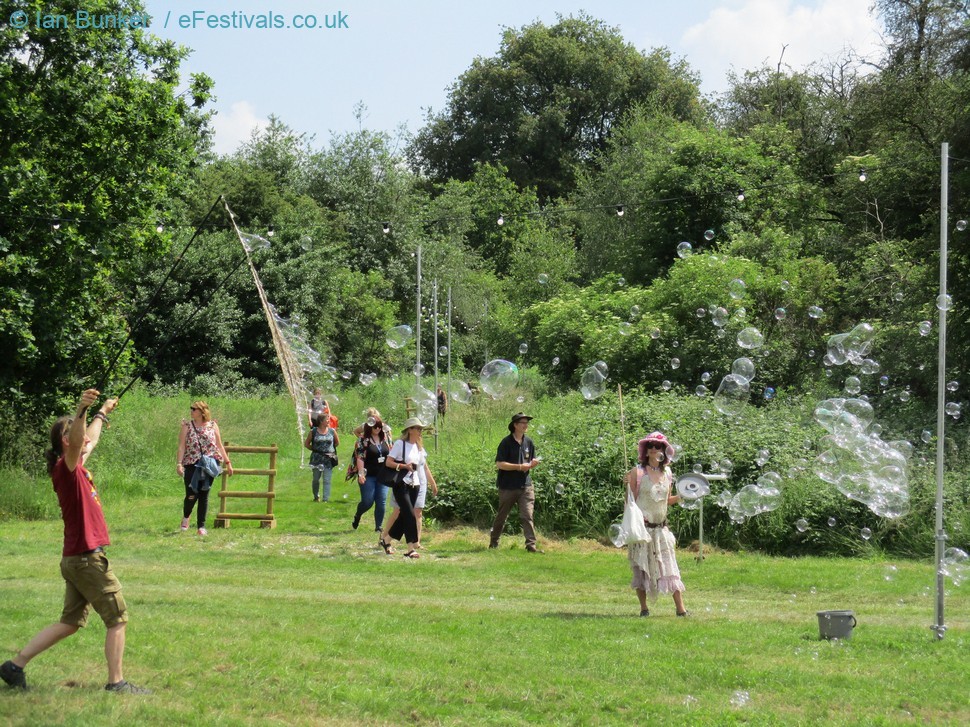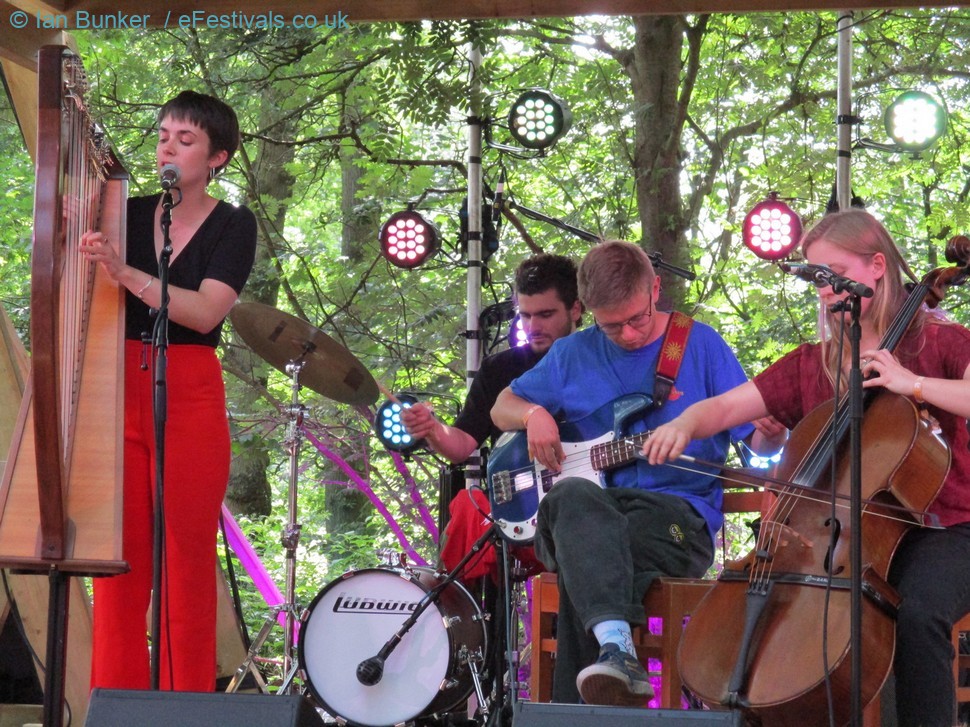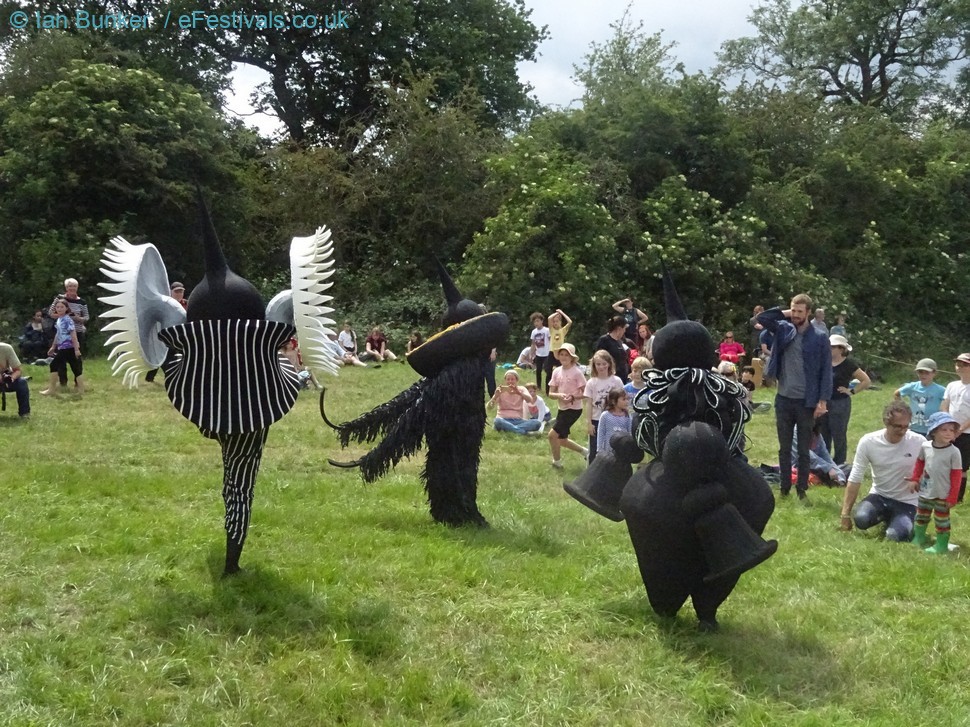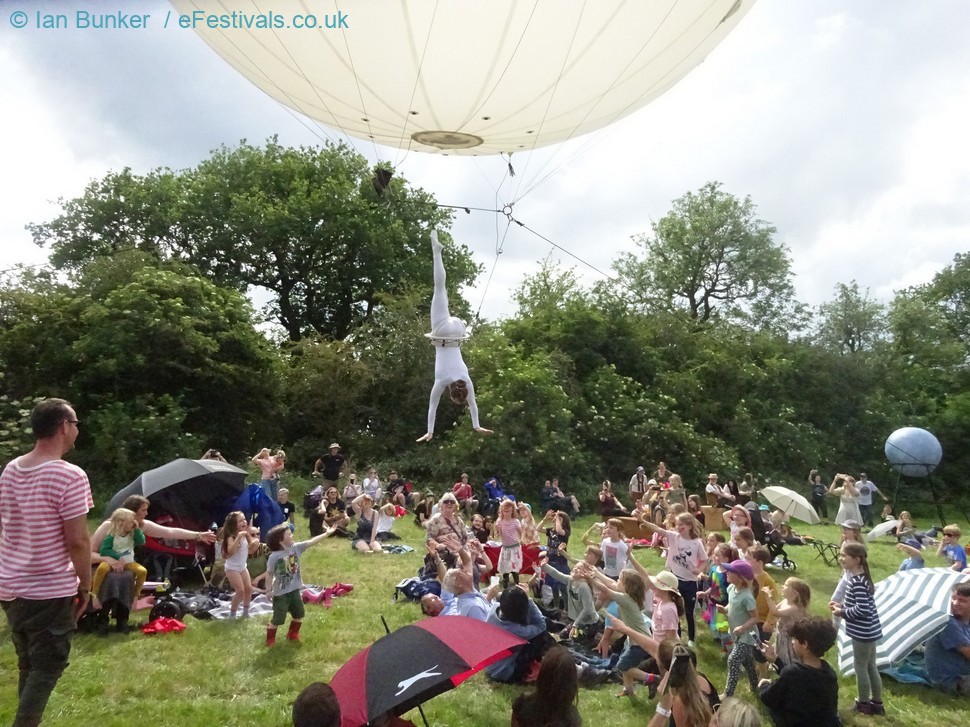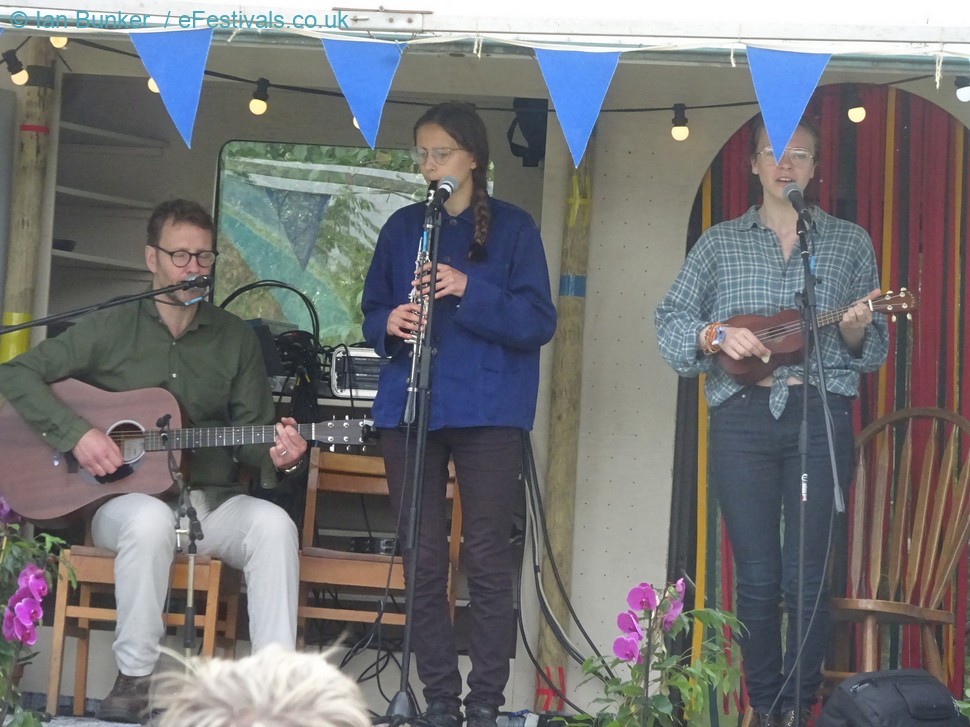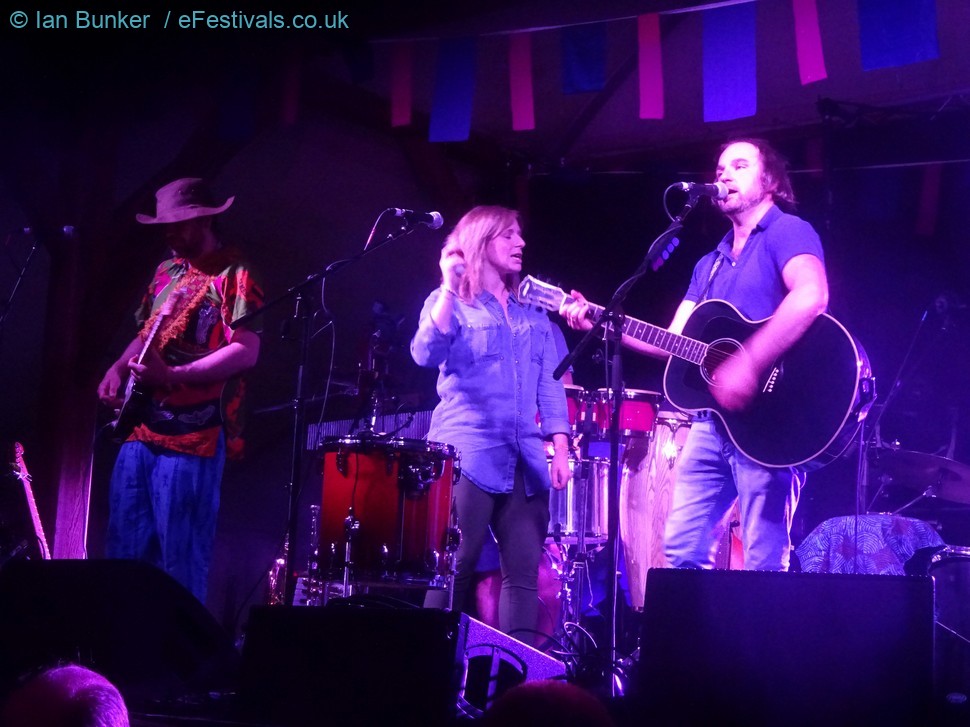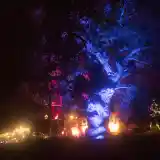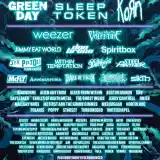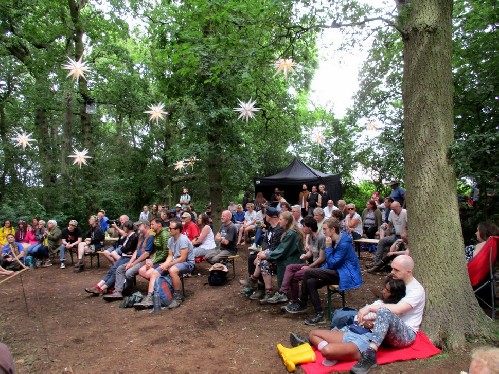
Timber Festival 2021
Friday 2nd to Sunday 4th July 2021Feanedock, Rawdon Road, Moira, Swadlincote, Derbyshire, DE12 6DQ, England MAP
currently £120 for adult weekend camping
One thing that nearly all festivals have in common is the claim that they are truly unique, and it’s true that different festivals have identifiable features. For the most part, however, such claims are overstated. You pretty much know what you’re getting when you sign up – bands in a field, with diversions for those times when you can’t handle the noise any more. Not so Timber Festival, an event that takes place slap bang in the middle of a forest that used to be an open-cast coal mine. It really is like no other festival I’ve been to.
Great swathes of the Midlands were scarred by heavy industry, leaving behind a post-industrial wasteland. An audacious plan was hatched in the nineties to plant a million trees, reclaiming the landscape for nature – effectively creating a brand new forest. It’s in that stunning setting, thirty years later, that Timber took place, a festival imbued with the ethos and philosophy of the people that planted and nurtured the stunning flora of Feanedock, a 70 acre woodland that have relegated what went before to a distant memory. To be clear, this isn’t a festival simply taking place in a forest, it’s endorsed by the people who look after that forest, and it showed in every nook and cranny of its glorious setting.
With no overnight camping on the Thursday night (something they really should look into) Friday got off to a busy start, although this didn’t translate into anything approaching hassle or anxiety. Given this is one the first festivals in the UK for eighteen months, and that it was taking place under the restrictions of Covid regulations, I’d have easily excused a level of fractious engagement from the staff checking tests and tickets. Who would blame them for being a bit edgy, when incomers are pouring in, keen to get their tent up and on with the business of the day? Such magnanimity proved entirely unnecessary, however, as everyone involved was friendly, approachable, calm and assured. The punters paid this back, by queuing up politely while tickets were proffered, wristbands handed out, test results shown, all with the minimum of fuss, while stewards helpfully pointed and corralled folk through gates discretely manned, in a way that felt made you feel more like a welcome guest than a patron. We were being invited into one great big bubble of like-minded people and it felt wonderful.
Events in the main arena (though it quickly became apparent that “arena” was a misnomer) started mid-afternoon, but took second place to finding your feet in what is better described as an intriguing three dimensional labyrinth. In contrast to the generous expanse of the camping ground, the areas of the festival were tucked away, within enclosed greenery, around enticing corners, or down precipitous slopes. The program helped (despite being eccentrically laid out it was packed with information and great value at a fiver) but it was clear we were being invited to explore. Wandering around I saw a hand lathe turning chair legs, a man making charcoal, a fellow telling stories around a campfire, biodiversity bingo and a bloke literally hugging trees (he was measuring their girth, I was ensured). And all of this was in just the first area I stumbled into.
Down the hill (and it really was a hill, as the trip back to the tent each night proved) was the main stage, a beautiful structure made from oak described as a mobile barn. Here was further proof that they do things differently at Timber. I’ve been to festivals where you can hear talks about natural history, or giant insects, or the destruction of the planet, but not on the biggest venue of the festival. This was an event that took its message seriously and was determined to offer up a central platform to deliver it. Not quite ready to hear about a greener future this early in the weekend, however, I nipped past and headed for the Eyrie stage, where a full program of music awaited.
The Eyrie Stage was hidden within dense forest, and was another imposing wooden construction, built double decker style, so that an area for the musicians was topped by a DJ booth, teasingly on show. Anna McLuckie, backed by her band, offered up a fine start to the day with accomplished harp playing and a beautiful singing voice. I’m sure I wasn't alone in sitting in wonder at the simple pleasure of listening to live music. It was an emotion shared by those playing it, judging from the beatific smile of those on stage. More wandering followed – the jugglers were getting up a full head of steam in the circus area – but this stage kept drawing me back, such was the excellence of the music on offer. The elfin tones of Chloe Foy was followed by the impish good humour of Jason Singh, who readily abandoned his stunning beatbox set to offer up an impromptu spin of Henry Mancini’s Peter Gunn. He was inspired to do so by his bassist Shunya, who then returned with an equally inventive set of his own.
By now, the main stage had been readied for its evening incarnation, as the location for the big ticket music, the first of which was Orkney musician Erland Cooper, who performed compositions inspired by his island home. It was a haunting and immersive set, truly evocative of that faraway island, which he guided us towards with the aid of violins, cello and a feather. What followed was one of the biggest disappointments of the festival, when it was announced that Snapped Ankles wouldn’t be appearing. This was one of a handful of Covid casualties that started with Anna McLuckie’s guitarist, and one of the key acts I really wanted to see, so was a major blow. However, all was saved by their last minute replacements. As the name suggests, Balkan influenced band The Baghdaddies don’t take themselves too seriously, but they certainly got the crowd going. I reckon you could have powered the National Grid on the energy and enthusiasm they generated from an appreciative crowd. With no disrespect to the quirky, art rock of the unidentified members of the Ankles, the festival fell on its feet. The evening closed, for those who still had an appetite for revels, with Glencutwerk DJ on the top deck of the Eyrie Stage, playing music to a crowd delighted to be able to jig about in a way that up until a year ago seemed normal, but now seemed almost fantastical. But then simply being outside with other people seemed fantastical, as did chatting amiably to strangers. It had been a fantastical day.
The night was fairly fantastical too, albeit in a less positive way, as quite the most extraordinary downpour pelted down all night. It was not the best way to spend your first night in a tent for two years, but that’s the festival gods for you. It was some comfort that a day under cover beckoned, but before hunkering down, and determined to explore further, I ventured into the corners of the festival, first for Mayfly in The Halycon Days zone, an inventive dance routine featuring leaping fountains that got the two dancers even wetter than the rain had already achieved. The clouds cleared for Lost Opera in the Elemental area, a weird but jolly bit of nonsense that made use of your phone. “I haven’t got my phone” I told the fellow handing out leaflets, “Will it still make sense?” He looked at me askance, and replied candidly that didn’t make sense either way, as three figures, only vaguely recognisable as human, emerged from the trees, before cavorting before all assembled.
Letters to The Earth was a stark introduction to the day time main stage. Essentially, it amounted to reading statements from a public reflecting on a planet in crisis, and was a timely reminder that our troubles extend further than a virus. The Green Party’s Caroline Lucas followed, with an eloquent exposition of similar aims and ambitions. Personable though she was, it was no match for the splenetic anger of a twelve year old writing a letter to a planet ruined by an older generation.
A welcome break from earnestness was called for after that, and it came in a spherical fashion, via a woman suspended from a huge inflatable balloon. Heliosphere was a delight that transcended logic or explanation, as did Simon Armitage’s wilfully arcane music choices. Interviewed with unusual intelligence by Geoff Bird, it was one of three chats about music that lightened the load of the heavyweight discussions of the Field Notes stage. Perhaps less successful was Gavin Esler (as Geoff Bird put it, did we really need two white blokes talking about Bob Dylan?) but he seemed a decent enough chap. There was more chat to be had, this time about festivals, from Stuart Maconie and Elizabeth Alker, but I can’t say it was terribly illuminating.
Time in the talks tent duly served, I was grateful for The Unthanks, as polished and accomplished as ever, running through Honey Bee, King of Roads, and some clog dancing. Enjoyment was mitigated by the thunderous weather just beyond the curtilage of the awning covering us precious few, but hats off to the people outside that didn’t rush in and spoil it for those on seats. It was just another small example of how the festival was populated by the friendliest, most courteous, and thoughtful crowd I’ve ever had the good fortune to spend time with. Gruff Rhys was up next, who for me was one of the rare misfires of the festival. Out of practice, he was rightly cut some slack from an appreciative crowd, but I soon sneaked off to watch the footy. Somehow managing to miss all four goals by nipping off to see a tightrope walker and a light sculpture, it was good to be on firmer ground for the closing act of the night, and probably the highlight of the festival, The Hackney Colliery Band. Offering up a mix of covers and originals this was an incendiary all brass set that had the crowd going wild, albeit in a socially distanced manner. All the remained was for Indian Man to play AC/DC and Status Quo – not something I expected from a DJ set – before sending us off to bed, deliriously happy that our world – the world of festivals, communal appreciation, getting on with your neighbour, and just being plain and simple nice to the person standing next to you – had returned.
Sundays are always a bit odd at festivals – even if you have had a good time they are tinged with melancholy that it’s nearly all over. In the case of Timber, it was time to catch up on all the many things not yet seen. There was a strange thing going on in the cookery section – yes, there were cookery demos going on as well – that featured hoops (bamboo, not spaghetti), flying plates and calling me out for not shaking my booty enough. There was archery from White Rose Kyudojo, with an earnest fellow explaining how best to pierce body armour with an arrow. And there was Geoff Bird, the busiest man at the festival, having introduced and interviewed everyone on site, finally getting his moment in the sun. Together with his daughters, they made up The Screeching Blue Jays, an Americana band big on self-deprecation. Playing out the back of campervan in the Shivelight zone, it wasn’t the weekend’s strongest musical moment, but they were such a delightful bunch of people, you couldn’t help but applaud the effort.
Unshackled from Maconie’s podcast, Elizabeth Alker brought her Radio 3 weirdness to bear on the Eyrie Stage, with a wilfully odd cocktail of experimental artists. Sophie Cooper looped her trombone to impressive effect, while Alexandra Ayres twiddled knobs, giggled a lot, and strayed dangerously close to Bohman Brothers territory. Back on the main stage Julie Hesmondhalgh was charming, but no better than her Mum at explaining why she like her favourite records – “I just loved it” being the default setting. By now even the most stalwart of festival goer was faltering under the relentless rain. Some say rain doesn’t dampen the spirits, but it surely does, in the end, when the paths turn to mud and there’s nowhere to sit down. The crowd had thinned put considerably, and the camp site was half empty. It was a great pity, because it meant so many missed out on Sam Lee’s stunning performance. Folk music songs doesn’t begin to describe his quirky refashioning of traditional songs or his fine baritone voice. Similarly hard to pin down was Mirry, two gentlemen of mature vintage teasing noises out of a lap top and a guitar while the tiniest of videos, featuring Great Aunt Mirry, played out in front of them as the rain absolutely bucketed down. It was a fittingly bizarre swansong for Alker’s inspired curation of a beautiful space giving itself back to nature. We come, we go, but the trees and the rain will always be there.
With only two more acts on the main stage, that horrible feeling of a brilliant event coming to a close started to creep up on me. Field Music was pleasingly retro, with Talking Heads never far from my mind. Gary Stewart’s Graceland was, for me, less engaging. However well executed, and they were note perfect, finishing a festival with a cover band was never going to float my boat, though I should say the crowd loved them. What I’d rather do is cheat a bit, and shuffle my memory around, so that the last thing I did was go up to the place where I had started my Timber festival, in the area marked As The Crow Flies. I’d gone to take a peek at the Telling of Bees, something that I’d heard chat about all weekend. I found it underwhelming, particularly in the streaming rain, but I did notice a crowd around the campfire. There I came across Sam Lee, singing to those few huddled around the flames, unaccompanied and untroubled by the weather. As he spoke of brothers, meeting as strangers, but then parting as things came to an end, it was magical, and the perfect close to a perfect festival.
A question persistently occurred to me throughout this festival. Was this one of the best festivals I’d ever been too, or would I feel that way about any festival after such a long time? I suppose I can only really know for sure when I return next year, which I have every intention of doing. I do know it was carefully curated by clever people who know what they are doing. I do know it was superbly organised and a wonderfully relaxed experience. I know it was held on a beautiful site that I could have happily camped out in whether there was a festival or not. I know that every single person I met was a delight, who looked after the sight with loving care and a deep respect. And, perhaps most significantly, I know it was the best weekend I’ve had for a very long time.
Check out the photo gallery.
Latest Updates
 Timber Festival 2025
Timber Festival 2025festival details
 Timber Festival 2024
Timber Festival 2024line-ups & rumours
 Timber Festival 2024
Timber Festival 2024festival details
 Timber Festival 2023 - The Review
Timber Festival 2023 - The ReviewTimber battles gamely on despite the storms
 Timber Festival 2023
Timber Festival 2023photo galleries

